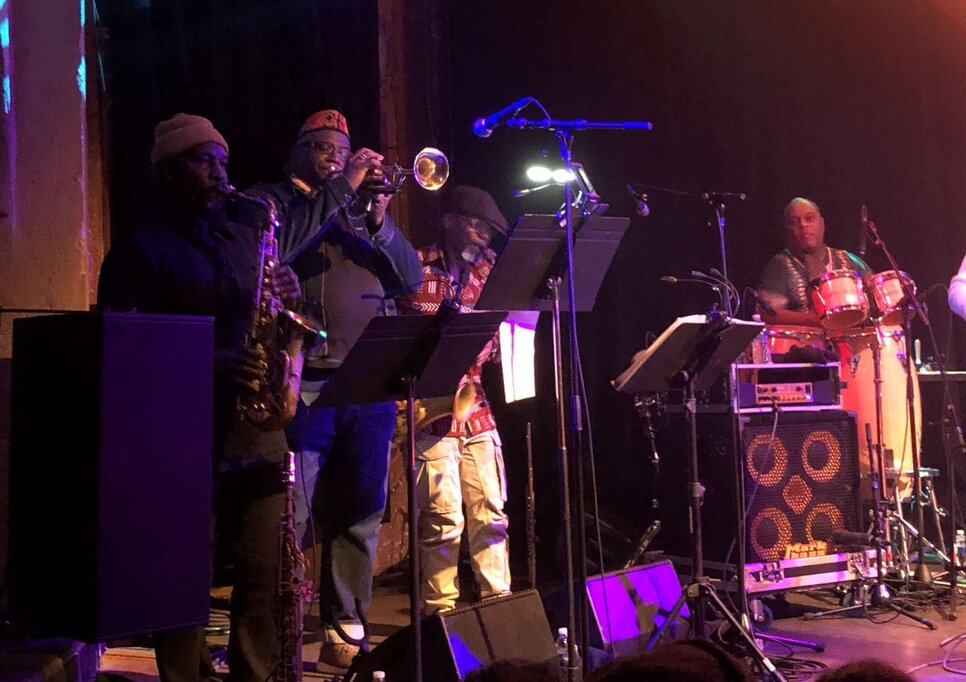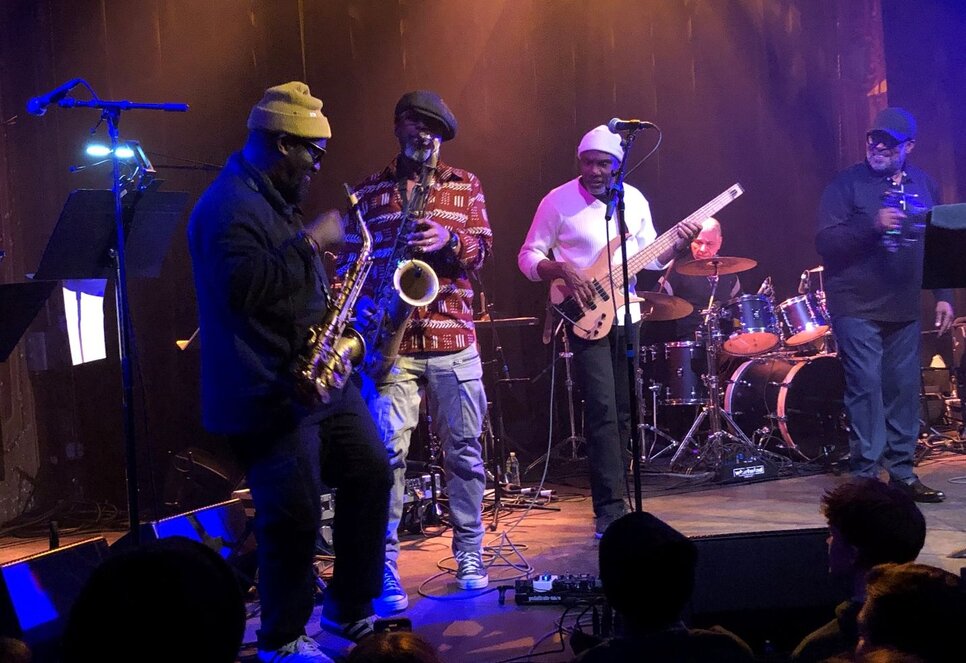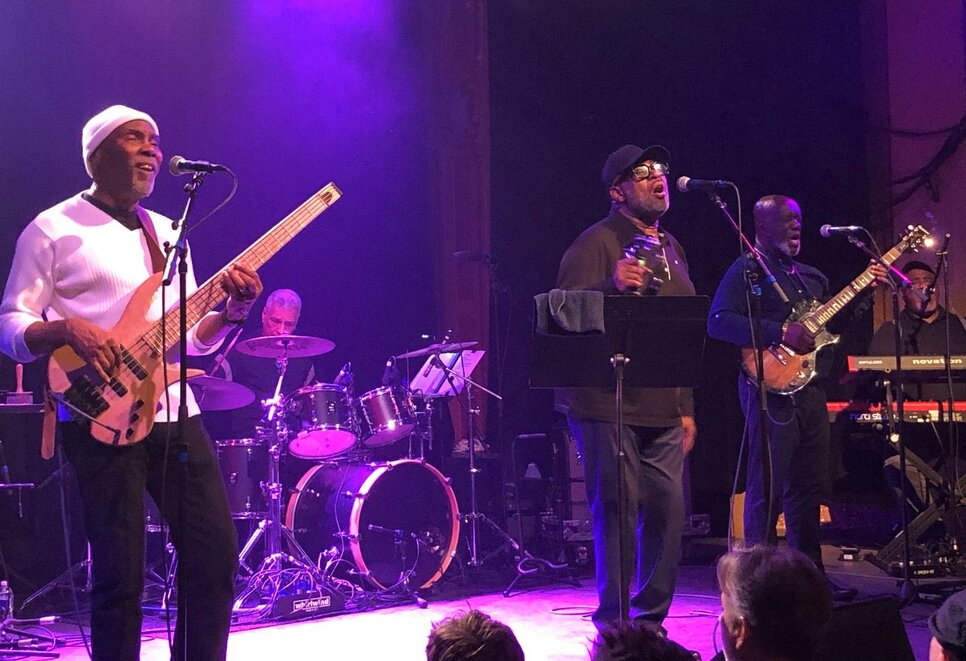Concert Review: Cymande at Bluebird Theater

Zombies, vampires, the Phoenix bird – a few bands look to these as role models in formulating a career path. Actually, Cymande didn’t consciously decide to follow in their footsteps, but that’s what happened. Cymande formed in the early 1970s in England and comprised a group of musicians whose families had immigrated from the West Indies. The nine original members, hailing from Jamacia, Guyana, and St. Vincent, gathered sounds from their homelands, added portions of styles floating through the air in England, tossed it all into their blender, and created a unique sonic landscape.
The band released three albums in the early 1970s to mixed success. They toured the United States, including as the opening act for Al Green, which exposed them to large audiences. Enthusiasm for Cymande among their fellow Brits, however, was muted. Frustrated by a lack of attention in their homeland, the band members went their separate ways in 1975.

But then, over the ensuing decades, people slowly began to discover Cymande. Rappers and DJs began digging into those early albums and sampling the infectious licks. Those samples caught ears around the world and many owners of those ears reached into the source material and pulled out Cymande. One by one and without any marketing or advertising budget, people became aware of Cymande, and slowly, the legend grew. Eventually, the band realized a fan base had developed, completely on its own, and with that growth came a demand for more concerts and recordings. By the mid-2010s, the band reformed and hit the road.
On the heels of the release of their album Renascence (BMG, 2025), the band has been on tour and stopped in Denver for a one-night stand at the Bluebird. Time has taken a toll on the original band members, but the leaders and principal songwriters remain vital and upfront in the band’s lineup. Guitarist Patrick Patterson and bassist Steve Scipio have been friends since age 13. When the band split in the 1970s, they went to law school and became lawyers in the Caribbean area. Now, back on stage, they also add backing vocals in addition to their instrumental duties. Their instrumental chops have survived the decades intact.

Friday night, the band laid down groove after groove, expertly crafted to incite widespread head-nodding. Funk is one of the many genres that Cymande threw into its musical blender over half a century ago and it remains prominent today. But it’s a subtle funk, one not intended to create neck dislocations, only steady head bobs. And that’s important, considering much of its audience has been watching middle age recede in the rearview mirror for a few decades. But that wasn’t the only demographic present at the Bluebird Friday night. The age range of the audience was as wide as the band’s lifespan. The 20-somethings and the Social Security crowd easily mingled with each other and all ages in between.
The band kicked off the evening with “Sweeden” from their new album. That tune, like most of the songs on the new album, seamlessly fits into the Cymande oeuvre lyrically, melodically, and rhythmically. During the course of the evening, the band offered two other new songs, “How We Roll” and “Chasing an Empty Dream.” The rest of the setlist focused on their early material and especially their first album Cymande (Janus, 1972), drawing five tracks from that one.

Perhaps the individual most responsible for Cymande’s signature catchy sound is bassist Scipio. Friday night at the Bluebird, he laid down those infectious bass lines, many of which have been sampled over the years. He handled the complex figures with a smile, often while adding backing vocals. Supporting those bass lines were the drums and the congas and together, they guaranteed those noddin’ noggins.
Another recently revivified item appeared before and after the concert when about a dozen people offered their vinyl Cymande records for autographs by the band. All the records in attendance were the first album and the second, Second Time Round (Janus, 1973). Janus was a subsidiary of the Chess record label, the famous Chicago blues imprint. In the 1970s, the operation had a good distribution system resulting in plenty of copies working their way to Colorado, many of which have survived for over half a century. Although the band recorded its third album, Promised Heights (Contempo, 1974), at Chess Studios, it was released on a different label, probably with inadequate distribution.
Although not an original member, lead vocalist Raymond Simpson has been a long-time band member. Friday night, he proved to be a charismatic frontman and his smooth voice and delivery contributed mightily to the often trance-inducing grooves. The three-man horn section provided unison bursts, punctuating melodic passages, as well as ensemble playing that was the focus of other parts and, of course, individual solos on top of the constant undulation below.
“The Message” from their first album got a new treatment with the addition of a chant, suitable for audience participation, “Music is the message and the message is music,” slightly reminiscent of Marshall McLuhan’s “The medium is the massage.” Another appendage tacked onto “The Message” was a brief tease of Bob Marley’s and Peter Tosh’s “Get Up, Stand Up.” Another chestnut receiving some modification since its first appearance over 50 years ago on Second Time Round, was “For Baby Ooh.” The original was a brief a cappella number with some percussion backing. Friday night, it was fully orchestrated and took on a gospel feel.
“Dove,” from the first album, has more than a little in common with the Doors’ “When the Music’s Over.” Each is an extended cut, the tunes go through many changes, sprinkle in doses of psychedelia, and rely heavily on well-placed bass notes to create an atmosphere. The studio version of “Dove” benefits from Patterson’s heavily reverbed, clear-toned guitar to make that atmosphere truly otherworldly. Friday night’s version recreated some of that atmosphere, but Patterson’s guitar didn’t quite match the studio version. Still, the live effect came close to the outer space vibes of the original.
Friday night, the band played with the exuberance of someone getting a second chance at life. Second Time Round was a fitting title for their second album, but today, it perfectly encapsulates Cymande’s enduring resurgence in the 21st century.
In the Cymande Documentary, https://vimeo.com/1024523815/9175e22cee, a subplot develops regarding the time various people who were interviewed for the film acknowledge when they first became aware of the band. For the record, your correspondent’s date is the mid-1970s upon coming across their first album at the college radio station where I worked at the time. I’ve been listening to them ever since. On vinyl.
Set List
Sweeden
Getting It Back
Do It
Crawshay
Chasing an Empty Dream
Brothers On The Slide
For Baby Ooh
Bra
Rickshaw
Dove
How We Roll
The Message with Get Up Stand Up
Encore
It’s Magic
The Band
Patrick Patterson, guitar
Steve Scipio, bass
Ray Simpson, vocals
Richard Bailey, drums
Adrian Reid, keyboards
Donald Gamble, percussion
Denys Baptiste, tenor sax, flute
Kevin Davy, trumpet
Tony Kofi, alto and soprano saxes
Stay connected to KUVO’s programs and our community! Sign up for the Oasis E-News today!


